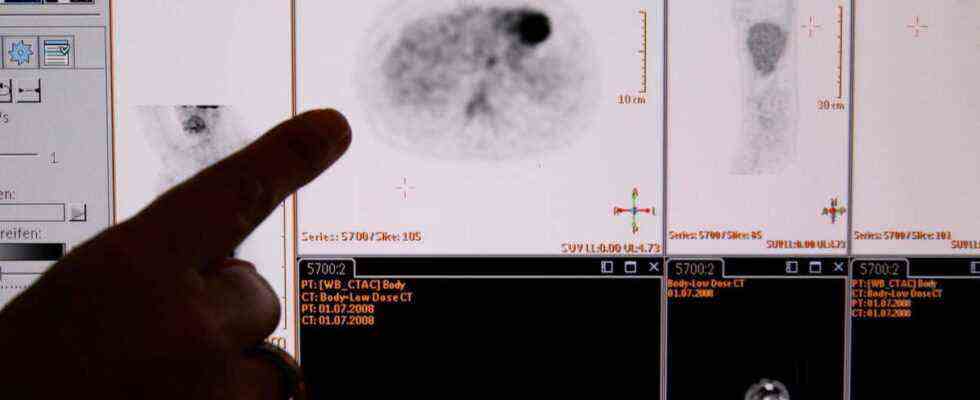A fatty liver can also lead to liver cancer in the long term. (archive image)
© Arne Dedert/dpa
Even people with a healthy diet can be diagnosed with fatty liver. Researchers are now investigating what’s behind it.
Kassel – Every fourth person over 40 in Germany is affected by non-alcoholic fatty liver. According to the German Liver Foundation, around a third of adults have an enlarged liver due to fat storage. Fatty liver is also becoming more and more of a problem in children.
Researchers at the Max Planck Institute have now found a new sign that points to the development of fatty liver. Particularly explosive: It also occurs in people who eat extremely healthily.
Fatty liver: symptoms and signs – what to look out for
But what exactly is fatty liver? According to the MSD Manual, it is “a conspicuous accumulation of certain fats (triglycerides) in the liver cells”. It is roughly divided into non-alcoholic fatty liver (NAFL) and alcoholic fatty liver (AFL), because heavy alcohol consumption can lead to this clinical picture, which, however, regresses comparatively quickly with abstinence. The problem with fatty liver is that it often remains symptom-free or the symptoms are only weak and unspecific. Possible signs are:
- fatigue
- Mild abdominal discomfort
- Enlarged liver can be diagnosed by a doctor
Fatty liver: Serious consequences when the liver becomes fatty
As emphasized on the medical information portal MSD Manual, a distinction must be made with regard to the prognosis of fatty liver. In the case of an alcohol-related illness, this recedes after about six weeks after the start of abstinence. Long-term damage is still possible with long-term consumption. It is even more serious if the causes of the fatty liver cannot be determined.
A fatty liver can also lead to liver cancer in the long term. (archive photo)
© Arne Dedert/dpa
Because then the liver is seriously damaged over a longer period of time. Long-term use of alcohol or certain drugs usually leads to inflammation, which then leads to fibrosis and cirrhosis. If the liver is inflamed and damaged for a long time, scars can form (fibrosis). When the scarring progresses to the point where the structure of the liver changes, it’s called cirrhosis, the MSD Manual defines. More than 30,000 people die each year from the complications of cirrhosis in the United States alone. Fatty liver can also lead to liver cancer in the long term.
Risk factors for fatty liver: who is affected?
The causes of fatty liver are varied. In addition to alcohol and certain medications such as corticosteroids, obesity can also be a cause. According to the MSD Manual, toxins and metabolic disorders such as insulin resistance also play a role. Pregnancy can also be the cause. The combination of excessive body weight and insulin resistance can lead to increased accumulation of fat in the liver cells. Scientists from the Max Planck Institute have now identified another factor.
Because: Even slim, normal weight people who eat healthily can be affected by fatty liver. The researchers suspected that two special genes could play a role. In your study, published in the journal Nature, they worked with mice, patient data, human tissue and liver organoid cultures. The latter are special liver cells (hepatocytes) that were present in three-dimensional microstructures. They used this to study the genes and how they change. With a clear result.
Fatty liver despite a healthy diet: New study provides insights
A loss or mutation of these two genes in well-fed mice led to an accumulation of fat in the liver and increased inflammation. The change in genes increased the risk of hepatitis and fatty liver in humans. In addition, the risk of liver cancer was significantly increased.
Meritxell Huch, one of the study’s authors, explains in a statement from the Institute: “In view of the alarming rise in fat and sugar consumption worldwide, it could be important for therapeutic measures and the management of the disease to identify those people who, due to their genetic mutations, already have it are predisposed.” However, further studies are necessary in order to develop drugs and therapy options that can help these people. (slo)
The information given in this article does not replace a visit to a doctor. Only experts can make the right diagnosis and initiate appropriate therapy. The intake of medication or dietary supplements should be discussed with a doctor beforehand.

